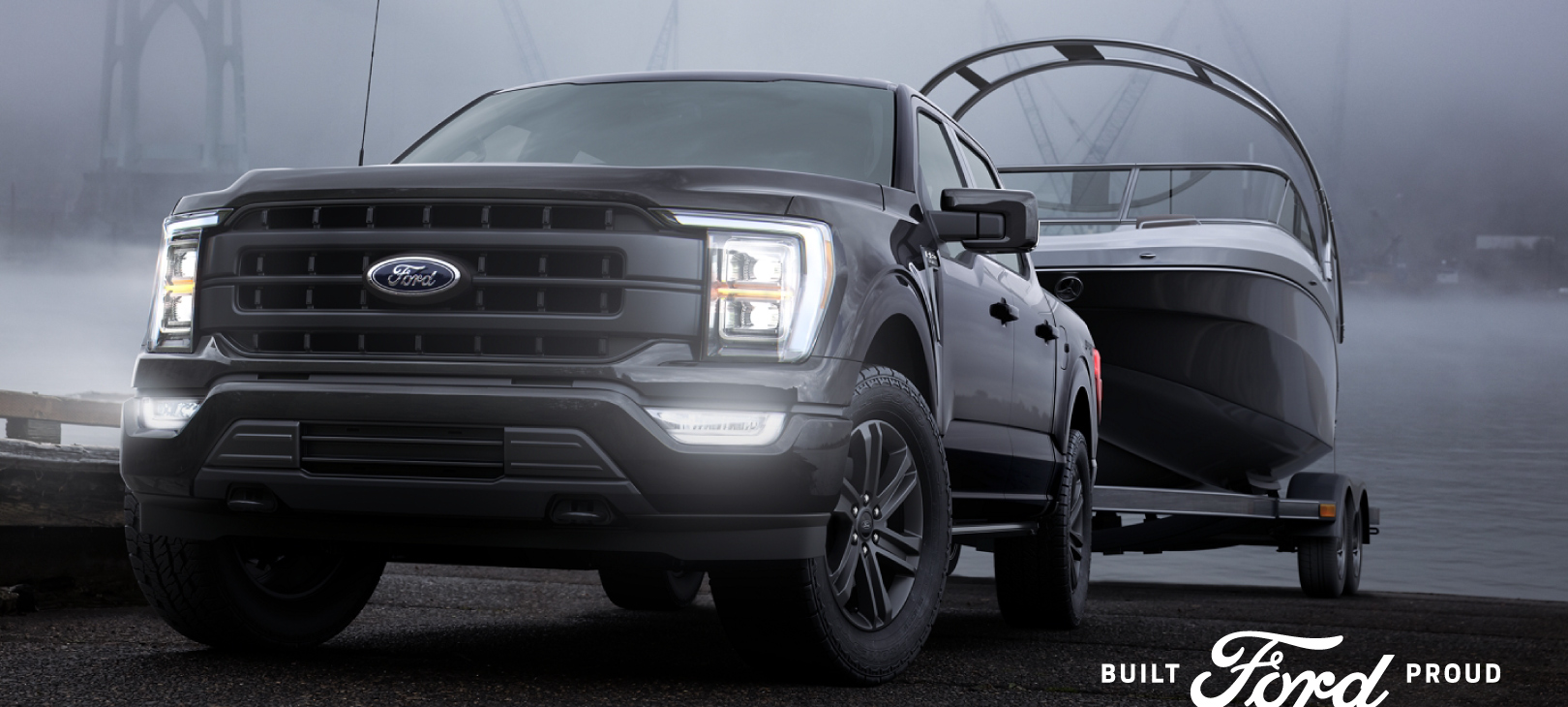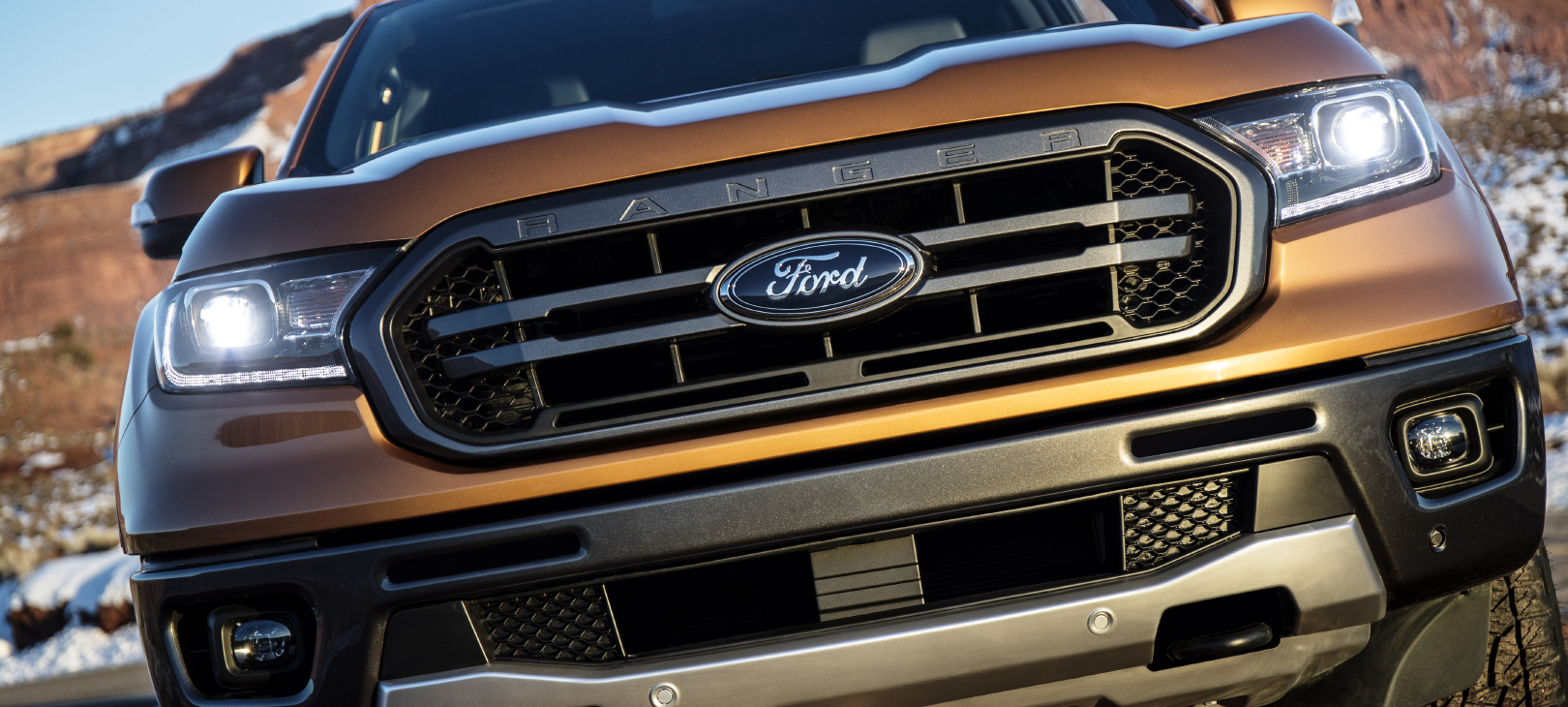ALL-NEW 2015 EDGE SHOWCASES FORD’S BEST TECHNOLOGY, MORE DRIVER-ASSIST FEATURES, IMPROVED PERFORMANCE, CRAFTSMANSHIP
The all-new Ford Edge demonstrates what happens when a proven leader gets even better. The original crossover utility vehicle from Ford has been completely reworked for 2015, and is now loaded with more technology, higher levels of craftsmanship and greatly improved vehicle dynamics. By every measure, the all-new Ford Edge is a better vehicle.
When launched in late 2006, Edge helped to define the crossover utility vehicle segment in North America, the biggest such market in the world. With a car-based design rather than traditional truck-based SUV underpinnings, Edge delivered better on-road comfort, fuel efficiency and overall driving dynamics. It was proof a utility vehicle could meet the demanding needs of everyday commuters.
The 2015 Edge – slated to begin reaching Ford showrooms in North America this spring – is all-new from wheels to roof, designed to reset the standard in the two-row utility vehicle market. It has been reimagined with a stronger, more athletic shape, retooled to meet higher expectations for quality, and reengineered to add more features and technologies to provide a more rewarding, engaging driving experience. The all-new Edge will be sold in more than 100 markets across the globe.
“The original Edge was our first entry into the world of crossover utilities – a technologically advanced vehicle that was the perfect blend of sedan comfort and efficiency with SUV functionality,” said Raj Nair, Ford group vice president, Global Product Development. “Now, we are building on that success, building on the emotional appeal of the vehicle by offering more of the technology our customers want in a package that meets the highest expectations for quality and craftsmanship.”
With the all-new Edge, Ford is also building on its global utility vehicle leadership, having delivered four consecutive years of record utility vehicle sales. In 2014, the company sold an all-time-high 1.4 million utility vehicles in markets worldwide – up 11 percent from 2013.
In North America, Ford was the top-selling utility vehicle brand for a fourth consecutive year in 2014, and posted strong performance in other markets as well. Ford Kuga sales jumped 31 percent over 2013 levels in Europe, for an all-time best-ever sales year. In China, Ford utility vehicles are hot, with Explorer sales for 2014 more than double 2013 levels, and Kuga and EcoSport sales gaining 42 percent. Edge sales climbed 20 percent in China last year.
Production of the 2015 Ford Edge began at Oakville Assembly, near Toronto, in February. Following its initial launch in North America, the all-new Edge heads to markets in Europe, South America and Asia Pacific.
Dynamic all-new body and suspension
The 2015 Edge will deliver the confident, smooth driving experience customers expect from Ford.
“The all-new Edge has been remade in every single detail – always keeping in mind the customer who expects something distinctive and powerful,” said JD Shanahan, chief program engineer for Edge. “With a structure more rigid than ever and a suspension tuned to the highest global standards, the 2015 Edge is a high-tech utility that delivers a special driving experience customers will feel from their initial moments behind the wheel.”
Central to the improved driving dynamics is an entirely new body structure and redesigned front and rear suspension developed to better isolate road imperfections and absorb noise without compromising handling.
The front-wheel-drive Edge retains a MacPherson-type front suspension, but features a sophisticated, entirely new integral-link independent rear with coil springs and a 23-millimeter antiroll bar. The advanced new system has been tuned to deliver a more dynamic, engaging ride customers will feel immediately.
Ford development tests indicate a 20 percent improvement in roll control and damping in the all-new Edge. Steering feel is improved 30 percent, with parking effort reduced 30 percent thanks in part to the new electric power-assisted steering.
The use of more high-strength steel, including boron steel in the B-pillars, results in a solid body structure that provides a far better platform for the new suspension to work. The all-new Edge is 26 percent stiffer in reacting to bending forces and 14 percent stiffer reacting to twisting forces over the 2014 model.
This means less noise, vibration and harshness characteristics – giving Edge customers a quieter, more substantial ride in a vehicle nicely suited for the everyday commute but ready to have fun when the road opens up.
Two new engines, three total powerplants to choose from
In North America, the all-new Edge features three engine options, two of which are new powerplants – a standard twin-scroll 2.0-liter EcoBoost® four-cylinder and a 2.7-liter EcoBoost V6. A naturally aspirated 3.5-liter V6 engine is available. All models are equipped with dual output exhaust and a six-speed automatic transmission.
The twin-scroll 2.0-liter EcoBoost, making 245 horsepower and 275 lb.-ft. of torque, is significantly improved over the previous 2.0-liter EcoBoost. Beyond efficiency advantages, this new engine provides more capability. Edge equipped with 2.0-liter EcoBoost can be ordered with newly available all-wheel drive and a towing package capable of hauling a 3,500-pound trailer. (In 2014, the four-cylinder Edge was front-wheel drive only. No trailer tow package was offered.)
Among a host of changes to the 2.0-liter EcoBoost is the twin-scroll design enabling optimized camshaft timing for improved engine performance and reduced turbo lag. A new, lighter engine block casting along with new aluminum balance shaft assembly shaves six pounds from the engine’s gravitational weight.
Other changes include lighter pistons; a newly designed, integrated exhaust manifold; and a new, high-pressure direct-injection fuel system for finer fuel atomization. These upgrades pave the way for an increased compression ratio of 9.7:1, up from 9.3:1, for improved overall fuel efficiency.
When equipped with the new 2.0-liter EcoBoost engine, the 2015 Edge is expected to be quicker in 0-60 mph acceleration than the 2014 model. EPA-estimated fuel economy ratings are still among the best in the segment, with the front-wheel-drive Edge returning 20 mpg city, 30 mpg highway and 24 mpg combined.
On the other side of the engine spectrum is Edge Sport and its exclusive, all-new 2.7-liter EcoBoost engine that provides an exceptional combination of power and efficiency. The new V6 delivers a small increase in horsepower over the previous 3.7-liter V6 engine, and a 25 percent increase in torque – for a total of 315 horsepower and 350 lb.-ft. of torque. Peak torque is available at 2,750 rpm, far lower in the performance band than the 2014 model’s 4,000 rpm, for a better performance feel.
A 1.0-second improvement in 0-60 mph acceleration is expected, with 45-65 mph acceleration also expected to be greatly improved – making Ford Edge Sport a top performer in the segment.
The front-wheel-drive Edge Sport returns EPA-estimated fuel economy ratings of 18 mpg city, 27 mpg highway and 21 mpg combined. EPA-estimated ratings for the all-wheel-drive model are 17 mpg city, 24 mpg highway and 20 mpg combined. Even with improved performance, fuel economy estimates are either equal to or better than the 2014 Edge Sport.
The twin-turbocharged V6 in the all-new Edge Sport is a world-class engine, providing a remarkable combination of advanced materials expertly applied. It draws its design from the best of the efficient Ford EcoBoost lineup, and takes cues from the unmatched durability of Ford Super Duty Power Stroke® diesel engine technology.
The 2.7-liter EcoBoost employs compacted graphite iron in its cylinder block – same as that used in the 6.7-liter Power Stroke. This advanced block allows for a stiff and compact design that returns exceptionally refined noise, vibration and harshness control. The compacted graphite iron core is mated with a die-cast aluminum engine-block ladder frame and composite oil pan – saving weight by applying advanced materials where they are needed most.
Edge Sport features front and rear antiroll bars that are 15 percent stiffer than the base model, and unique rear monotube dampers that are larger in diameter. The coil springs are 10 percent thicker. With improved damping and control, Edge Sport offers 15 percent to 20 percent better overall road-holding capability – giving the driver more control, sharper steering and greater confidence.
Paddle-activated SelectShift puts driver in control
All three Edge engines are mated to Ford’s SelectShift® six-speed automatic transmission featuring standard paddle-shift activation, giving drivers the ability to manually select gears via race-inspired paddles on the steering wheel.
The SelectShift transmission features two modes of operation – drive and sport. Sport mode offers a more aggressive shift pattern, allowing the engine to rev higher during acceleration and hold lower gears longer to support spirited, fast-paced sessions.
Unlike many paddle-shift systems, the Edge six-speed automatic is always “live in drive,” so the driver does not have to select sport mode to enable operation.
The available intelligent all-wheel-drive system for the new Edge is on-demand and seamless – there are no knobs or switches to activate. An electronically controlled clutch, which can engage faster than a human can blink, transfers power between front and rear axles, sending up to 100 percent of the power to the front or rear.
New level of technology for better driving
The 2015 Edge is a technology leader for Ford, with a suite of standard and available technologies designed to improve both the driving experience and comfort level for vehicle occupants. Technology features offered for the first time include enhanced active park assist, side parking sensors and a front camera with washer.
“The new Edge is a rolling showcase of Ford’s commitment to developing and offering the most advanced technology in the business,” said Shanahan. “Our customers have embraced technology – from smartphones to wearable devices that track their health – it’s a part of their lives. We want to make technology a bigger part of their driving experience as well.”
Key standard and available technology features include:
:
- Active Grille Shutters: Help improve aerodynamics, particularly at highway speeds
- Adaptive cruise control and collision warning with brake support: Uses radar to detect moving vehicles directly ahead and change the cruising speed if necessary
- Air Curtains: Create a high-pressure curtain of air alongside the vehicle using smart duct work, improving aerodynamics at high speed
- Blind Spot Information System: BLIS® uses radar to trigger a warning when another motorist is in the driver’s blind spots
- Cameras: New 180-degree front camera with washer; standard rear camera
- Cross-traffic alert: Uses radar to help alert drivers to oncoming traffic when backing out of a parking space
- Enhanced active park assist: Builds on Ford parallel parking technology and includes a system to guide the vehicle into a perpendicular parking space. The system can also steer the vehicle into and out of a parallel parking space
- Forward and reverse sensing systems: Provide audible alerts designed to help drivers avoid obstacles when parking
- Hands-free liftgate: Simple kick motion below center of rear bumper allows customer to unlock and raise liftgate
- Heated and cooled front seats, heated rear seats, heated steering wheel: Amenities make occupants more comfortable, and every drive more enjoyable
- Lane-keeping system: Alerts driver to steer vehicle back into its lane if it has drifted
- Side parking sensors: Using algorithms, sensors measure speed and steering wheel angle to warn drivers of obstacles on either side of the vehicle during parking or low-speed maneuvers
- SYNC® with MyFord Touch®: Now available for more trim levels; standard on Edge Sport and Titanium series
Safety technologies available on Edge include:
- Active glove box knee airbag: Advanced new design uses glove box front to cushion the knees of the front passenger in a crash. A pliable, injection-molded plastic bladder is sandwiched between inner and outer glove box door panels. On impact, a small inflator fills the bladder, extending the glove box outer door panel toward passenger’s legs
- AdvanceTrac® with Roll Stability Control™: Uses sensors to measure the roll rate of the vehicle and predict its roll angle. Based on this information and measurements from other vehicle dynamics sensors, the system can adjust engine torque and brake pressure at all four wheels to help the driver maintain control of the vehicle
- Curve Control: Uses the same sensors as Roll Stability Control to detect and measure roll rate, yaw rate, lateral acceleration, wheel speed and steering wheel angle to help drivers follow their intended path by slowing the vehicle more efficiently while maneuvering a curve
- Inflatable rear safety belts: Advanced restraint system combines attributes of safety belt and airbag technologies to reduce head, neck and chest injuries in frontal crashes for passengers in second-row outboard seating positions by distributing crash force energy across five times more of an occupant’s torso than a traditional safety belt
Higher standards for quality and craftsmanship
The 2015 Ford Edge is available in four trim levels, including SE, SEL, Sport and – for the first time – a Titanium series to meet customer demand for more premium offerings. All pricing detail is available at www.ford.com.
“We really focused on meeting the highest craftsmanship standards in developing the all-new Edge,” said Michele Bartlett, Ford marketing manager for large cars and utilities. “The idea was to create not just a high-quality exterior and interior, but to give the customer a holistic, first-class experience.
“The Titanium trim level has been a real success story for Ford – particularly in products such as Fusion and Escape,” Bartlett added. “Our customers are telling us, ‘We are interested in technology and an exceptional look and feel.’ Titanium delivers that.”
The 2015 Ford Edge represents a significant step forward in both material and visual quality. Throughout, seams are tighter and more consistent, with the overall design executed to reduce visual cutlines. The team worked out the smallest of details – rethinking how the front doors meet the instrument panel, simplifying merging points and reducing potential alignment issues.
The dashboard and center console are carefully designed and shaped to look like one thin, streamlined piece. A central 8-inch LCD touch screen supporting SYNC with MyFord Touch is now more widely available.
Storage areas have been improved throughout the cabin, with a covered media bin on top of the center stack; an open, pass-through storage area beneath the climate controls; an open storage area on the instrument panel, below and to the left of the steering wheel; and large pockets on each door.
Thanks in part to smart design work and thinner, more supportive next-generation seats, the Edge interior is larger and more spacious. Adding to the openness, Edge will continue to offer one of the largest sunroofs in the business – Ford’s panoramic Vista Roof® measuring 47.7 inches front to rear.
The 2015 Edge gains 3.9 inches in length and 1.3 inches in height, making it 188.1 inches long and 68.6 inches tall. Wheelbase increases nearly an inch, growing from 111.3 inches to 112.2 inches.
The all-new Edge cabin is larger than the outgoing model in nearly every measure. There is additional headroom for all passengers, and legroom for second-row passengers increases 1.0 inch. Cargo capacity also is up, with 39.2 cubic feet of space behind the second row of seats – 7.0 cubic feet more than the previous model. With the second row folded, there is now 73.4 cubic feet of cargo capacity in the all-new Edge – a gain of 4.5 cubic feet.
Quieter than ever
The all-new Edge is not only more refined and comfortable, it’s also quieter.
In wind tunnel tests, Edge proves to be more than 1 sone (sound perception measurement) quieter than its predecessor. This enhanced quietness is due to better sealing of the body, insulation improvements, and powertrains that are less noisy and better isolated from the cabin.
Standard for 2015 on all models is acoustic windshield glass, along with acoustic underbody panels and wheel well liners – reducing road and wind noise and helping improve aerodynamic performance. Titanium models are even quieter, incorporating acoustic glass on driver and passenger side doors.
When equipped with the twin-scroll 2.0-liter EcoBoost engine, vibration levels at idle are 2 decibels quieter than the previous model. In moments of heavy acceleration, the revamped engine emits a quieter, more refined sound due to multiple changes including an acoustic wrap for the intake manifold, an upgraded heat shield and modified oil pump. On all models, a 360-degree hood seal contributes to overall vehicle quietness.
Edge Sport’s Active Noise Cancellation technology manages and enhances the sound of its powerful 2.7-liter EcoBoost engine. Using three microphones strategically placed throughout the cabin, the system is able to generate opposing sound waves directed through the audio system – enhancing overall cabin ambience.
Even the selection of tires for the all-new Edge results in a better on-road experience. Larger tires are often associated with unpleasant road noise, but the 20-inch tires available for Edge Sport and Titanium trim levels are a full 2 decibels quieter.
Built to be the best
A $700 million (U.S.) renovation for Ford’s Oakville Assembly Complex has delivered significant improvements to the facility where production of the all-new Edge is under way. Updates include more than 250 new, more advanced robots, many of which are installed to work to the most demanding levels of precision – with duties that require thousandths-of-an-inch accuracy to ensure repeatable, high-quality assembly.
“Some unique technologies have been incorporated into the plant – all designed to bring a higher level of quality at a rate that is capable of being repeated,” said William Cowell, Oakville Assembly plant manager. “The higher level of complexity in the build process means employees are interfacing with more advanced systems and technology that can significantly improve quality in ways our customers will be able to see and feel.”
Oakville Assembly has been recognized for its environmental efforts. The plant is the first North American assembly plant to go zero waste-to-landfill, and recently upgraded to LED lighting across the facility, replacing 7,000 lights for an estimated 15 million kilowatt-hours of energy saved per year.




